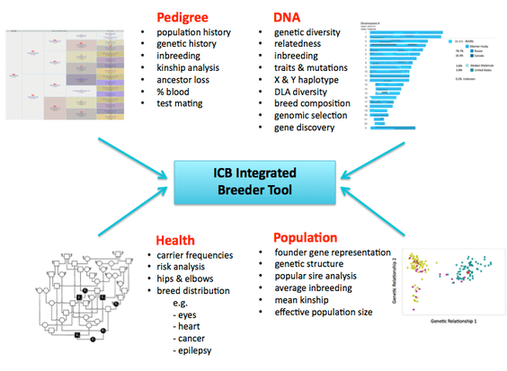ICB Breeder Tool (Beta)
A key component of the ICB Breeder Tool is the information about each dog's genotype. This contains information about homozygosity (degree of inbreeding), disease mutations, genes for particular traits, and other specific attributes of the genes and chromosomes. In a database with DNA information about other individuals of the same breed, this information can be used to determine the genetic diversity of the breed, the genetic "landscape" (i.e., genetic groupings by country, color, field vs bench), relatedness (genetic similarity) between individuals, identification of individuals that are most valuable genetically to the breed, and so on. The genotype data can also be used to confirm pedigree relationships. The addition of health information to the database provides breeders with a powerful tool that can be used to make breeding decisions that reduce the risk of genetic disorders in individuals as well as protect the health of the gene pool.
|
ICB Breeder Tool DNA Genotyping Kit: $185/dog
The genetic analysis for each dog will include:
Addition of the data to the ICB Breeder Tool database is included in the price of the kit. |
The ICB Breeder Tool (beta) is under development. In this beta stage, turnaround will be slow (possibly several months) and results might be revised as the tool develops. Don't use this DNA kit if you are in a hurry to obtain results.
You will receive a report of your dog's results as well as a file with the raw data for your dog. This analysis is research quality and is the best available today. You should never need to do another analysis on a dog.
You will receive a report of your dog's results as well as a file with the raw data for your dog. This analysis is research quality and is the best available today. You should never need to do another analysis on a dog.
To participate in the best test phase of the ICB Breeding Tool, we will need as much pedigree data for the entire breed as possible, the DNA information for each participating dog, and the available health information for the dog (to be provided separately). After you order your kit, you will receive it in the mail within a few weeks. It will contain a cheek swab and instructions explaining how to obtain a DNA sample and return it to us. We will add your dog to the ICB Breeder Tool database and notify you when we have processed your results, which might take a few months in beta testing. The cost of adding the genotype data to the ICB Breeder Tool database is included in the cost of the DNA kit.
If your breed is interested in participating during the development phase of the breeder tool, please contact Carol Beuchat at [email protected].
If your breed is interested in participating during the development phase of the breeder tool, please contact Carol Beuchat at [email protected].


